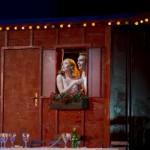By Rebecca Schmid
A new production of Donizetti’s L’Elisir d’Amore at the Deutsche Oper turned out to be a very Anglophone evening. Staged by Irina Brook (daughter of the legendary director Peter Brook), the opera starred young American singers Heidi Stober and Dimitri Pittas. And for the first time, the company introduced English subtitles alongside German above the stage. With Americans and Brits comprising most of foreign visitors—and 22% of the overall audience—some buzz was noticeable in the theater. “I was able to follow by going back and forth!” said an American behind me.
The West Berlin house may have long lost its status as the city’s wealthiest opera company, offering only three new productions next season, but it remains the principal destination for Italian repertoire and can still boast stars such as Joseph Calleja and Joyce DiDonato (even if only in concert stagings). While the young cast of Elisir might seem lightweight when held up against the roster of the Staatsoper’s most recent new production, a Tannhäuser starring big names in the Fach such as Peter Seiffert, Rene Pape and Anne Petersen, Brook’s production met with not a single boo—something I cannot remember during my four years’ time in Berlin.
Credit of course also lies with the ledes’ talent and energy. Stober is developing into a local star, singing with the Deutsches-Symphonie Orchester and Radiosymphonie Orchester alongside high-profile appearances at the Deutsche Oper, where she has been an ensemble member since 2008. She combines a pretty but ripe lyric soprano with a generous stage presence, and her grasp of the bel canto idiom has steadily improved. Brook casts the heroine Adina, a wealthy landowner is betrothed to the soldier Belcore, as the director of a theater who is, rather than a coquette, literally running the show. Stober executed the role with charm, her voice growing even richer in the final scene when she and Nemorino—here a cleaning man who woos Adina after acquiring the elixir of love (really, a bottle of wine)—finally kiss.
Pittas was stronger in solo than ensemble numbers, when his voice tended to sound thin, but he executed the critical third-act aria, “Una furtiva lagrima,” with affecting emotion and impressive breath control. One imagines he will only improve in the coming years. It was the Italian bass Nicola Alaimo, however, who stole the show as the itinerant medicine man Dr. Dulcamara. Addressing the audience from a catwalk in front of the orchestra, his final barcarole boasting the powers of his magic potion carried effortlessly above the orchestra with a natural sense of rubato and beautiful diction. The German baritone Simon Pauly found himself in less familiar waters, his coloratura in the opening scene lacking any sense of style not to mention legato, but he evoked the macho Belcore with emphatic tone and a touch a humor that fit well with Brook’s direction. As the peasant girl Gianetta, Alexandra Hutton impressed with lithe dance moves and a clean soubrette.
The chorus of the Deutsche Oper was in typically fine form (preparation by Thomas Richter), and choreography by Martin Buczkó exploited the house stage’s wide dimensions to fine effect with ensemble scenes such as the Act One finale on the village square. In Brook’s production, there is not one stage but two, the latter part of the Teatro Adina (sets by Noëlle Ginefri). This stage-within-a-stage concept pays no attention to Regietheater precedents, however, existing simply as a place where the villagers can observe numbers such as the classic duet of Dulcamara and Adina about a rich senator or a troupe of dancers rehearsing. The troupe’s rustic red caravans provided the perfect welcome for Dulcamara with an eccentric, gypsy-like cart.
Down in the pit, regular guest conductor Roberto Rizzi Brignoli coaxed spritely rhythms from the orchestra of the Deutsche Oper and achieved an excellent balance with the singers. But the instrumentalists were not able to match his intuitive understanding of the music’s finer details. The woodwinds in particular sounded unenthused and lackluster.
Tags: Alexandra Hutton, Deutsche Oper, Dimitri Pittas, donizetti, Heidi Stober, Irina Brook, L'Elisir d'amore, Martin Buczkó, MusicalAmerica.com, Nicola Alaimo, Noëlle Ginefri, Roberto Rizzi Brignoli, Simon Pauly, Thomas Richter
